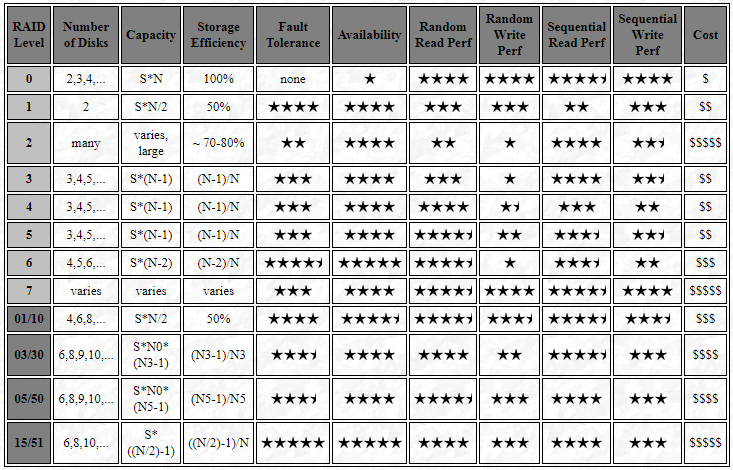Summary Comparison of RAID Levels
Below you will find a table that summarizes the key quantitative attributes of the various RAID levels for easy comparison. For the full details on any RAID level, see its own page, accessible here. For a description of the different characteristics, see the discussion of factors differentiating RAID levels. Also be sure to read the notes that follow the table:

Notes on the table:
- For the number of disks, the first few valid sizes are shown; you can figure out the rest from the examples given in most cases. Minimum size is the first number shown; maximum size is normally dictated by the controller. RAID 01/10 and RAID 15/51 must have an even number of drives, minimum 6. RAID 03/30 and 05/50 can only have sizes that are a product of integers, minimum 6.
- For capacity and storage efficiency, “S” is the size of the smallest drive in the array, and “N” is the number of drives in the array. For the RAID 03 and 30, “N0” is the width of the RAID 0 dimension of the array, and “N3” is the width of the RAID 3 dimension. So a 12-disk RAID 30 array made by creating three 4-disk RAID 3 arrays and then striping them would have N3=4 and N0=3. The same applies for “N5” in the RAID 05/50 row.
- Storage efficiency assumes all drives are of identical size. If this is not the case, the universal computation (array capacity divided by the sum of all drive sizes) must be used.
- Performance rankings are approximations and to some extent, reflect my personal opinions. Please don’t over-emphasize a “half-star” difference between two scores!
- Cost is relative and approximate, of course. In the real world it will depend on many factors; the dollar signs are just intended to provide some perspective.
| The PC Guide Site Version: 2.2.0 – Version Date: April 17, 2001 © Copyright 1997-2004 Charles M. Kozierok. All Rights Reserved. |
This is an archive of Charles M. Kozierok’s PCGuide (pcguide.com) which disappeared from the internet in 2018. We wanted to preserve Charles M. Kozierok’s knowledge about computers and are permanently hosting a selection of important pages from PCGuide.
